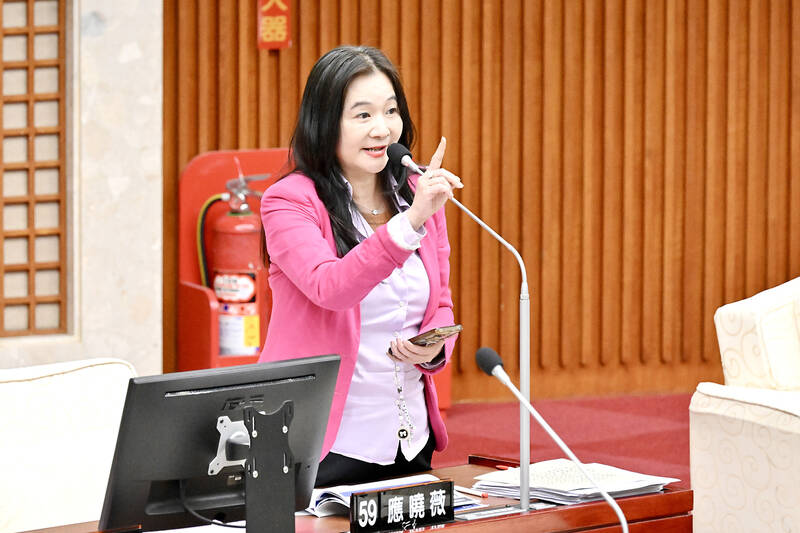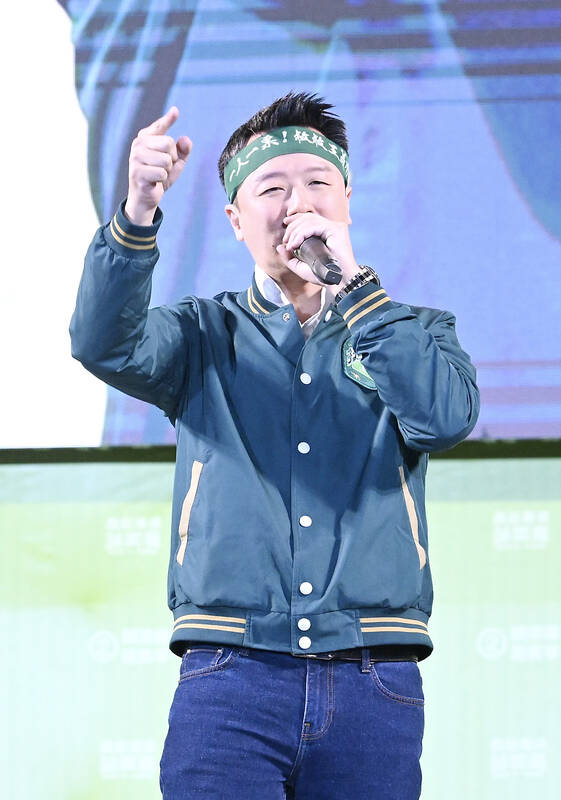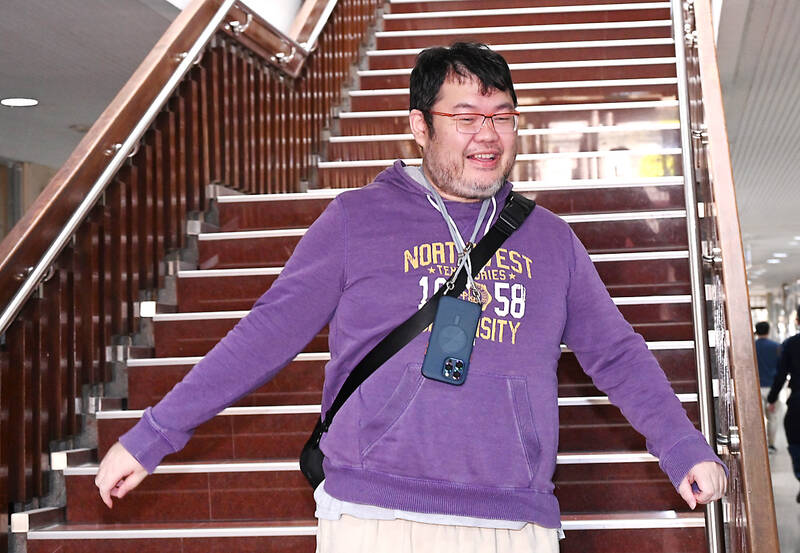The number of scandals and setbacks hitting the Taiwan People’s Party (TPP) in such quick and daily succession in the last few weeks is unprecedented, at least in the countries whose politics I am familiar with. The local media is covering this train wreck on an almost hourly basis, which in the latest news saw party chair Ko Wen-je (柯文哲) detained by prosecutors on Friday and released without bail yesterday. The number of links collected to produce these detailed columns may reach 400 by the time this hits the streets.
To get up to speed, two columns have been written: “Donovan’s Deep Dives: The TPP careening towards catastrophe” and “Donovan’s Deep Dives: TPP trainwreck continues with multiple investigations,” which go into day-by-day detail of this unfolding disaster from Aug. 6 to Aug. 15. Both can be easily found in search engines.
QUICK RECAP

Photo: Tsung Chang-chin
The previous column detailed how an increasing number of people close to Ko and the TPP were being investigated in multiple corruption cases. This included Pong Cheng-sheng (彭振聲), who served as deputy Taipei mayor under Ko. Pong was summoned for questioning by Taipei prosecutors on Aug. 12 and barred from leaving the country.
On Aug. 13, more allegations arose regarding the TPP’s campaign contributions, and on the same day, the Control Yuan announced they were opening an investigation into the TPP’s finances, which could result in fines of up to NT$1.2 million.
Prosecutors on Aug. 14 raided seven locations and interrogated six suspects involved in the TPP’s suspect financial deals. Vivian Huang (黃珊珊) resigned her seat in the party’s Central Standing Committee, but refused calls to resign her legislative seat.

Photo: Su Chin-feng, Taipei Times
Aug. 15 saw the Control Yuan report that the TPP’s presidential campaign claimed to have no expenses. The party maintained that those were included in regular operating expenses instead. The first of a series of questionable financial entries appeared, showing wildly high entries for inexpensive items.
SPENDING BIG, AUG. 16
More revelations of dubious entries in the party’s financial reports broke on Aug. 16. Answering to the revelation a day earlier that it had spent NT$9 million on tissues, the party said that the entry included expenses for more campaign items, not just tissue packs.

Photo: Tu Chien-jung, Taipei Times
Then colorful Internet commentator Liu Yu (劉宇), widely known as 4xCat (四叉貓), released the revelation that Ko and his team spent NT$800,000 on vehicle rentals. The party replied that it was for large buses and included paying drivers, room and board and other travel expenses, and again they just lumped it under this one entry.
A Taipei City councilor then released information that 130 “phantom” taxi rides were found, including 69 whose receipts had vehicle numbers not registered as taxis, 29 with vehicle numbers for vehicles that did not exist and 33 other miscellaneous hard-to-explain entries. The TPP blamed the taxi drivers and their own party personnel for not carefully checking every receipt against the vehicle number.
The TPP’s Central Review Committee met to discuss possible disciplinary measures against Huang, outside accountant Tuanmu Cheng (端木正) and Lee Wen-chuan (李文娟), director of MuKo Public Relations Marketing Limited (木可公關行銷), one of the companies being investigated by prosecutors. They came to no conclusions and announced they would meet again the following week.
“SECRET” “DAY ZERO” MEETING, AUG. 17
Aug. 17 saw political commentator Lee Zheng-hao (李正皓) release information on a “secret” March 10, 2020 meeting about the Core Pacific Mall that included Ko and a female “high-ranking heavyweight” with “good relationships between the Taipei City Government and businesses” was there acting as a “controller” or fixer.
In other words, he was implying that Vivian Huang was this person. This was billed as a “Day Zero” meeting that may have been the origin of the alleged Core Pacific corruption case, using a trendy reference to the upcoming television series on an invasion of Taiwan by China.
SET News was able to confirm that Ko, then-deputy mayor Huang and Taipei City Councilor Angela Ying (應曉薇) of the Chinese Nationalist Party (KMT) were all in the meeting. Lee said that seven days after the meeting, Core Pacific wrote a citizen petition, which Ko’s office sent off two days later to the Urban Development Bureau “to handle,” implying they were taking advantage of the legal provisions of the law to increase the project’s floor space for financial advantage.
Previously, Ko said as mayor he would not have “meddled” in the details of the Core Pacific project, but this meeting suggests otherwise. Further undermining that assertion, Taipei City Councilor Yu Shu-hui (游淑慧) produced a memo apparently written by Ko and signed and chopped by him from Feb. 24, 2020 to the Bureau specifically addressing the floor space issue, but at this stage suggesting that the Bureau not allow them to get that floor space to avoid the appearance of profiting from it. However, in March, following the meeting, it was approved.
Ko, when asked about the Core Pacific case by the press, gave an exasperated response of “(if they) want to issue me a summons, (then) just issue me a summons (and) immediately clear this all up!”
Meanwhile, 4xCat was keeping up the pressure and revealed that the Ko campaign had given NT$2 million to MuKo to rent two campaign sound trucks. MuKo is headed by the sister of Ko’s campaign financial officer and is one of the people interrogated and currently out on bail. 4xCat pointed out that it would have been cheaper for the TPP to buy the two vehicles outright, which is probably true, but the rental deal likely came with hired professional drivers so unless the TPP could find free volunteer professional drivers, they might not have saved money.
One of the two major players not involved in any of the scandals at this point was Tsai Pi-ru (蔡壁如), who was once Ko’s right-hand go-to person, but the relationship between the two appears to have soured and she took a job as a consultant to the Taichung City Government. During this period, she has been sniping in the press at Huang, blaming her for the whole financial scandal mess while avoiding placing any blame on Ko himself.
Tsai noted that if she had been around, hinting at her former central role in the party, this whole mess would never have happened — though she did note that she could not guarantee nothing would have gone wrong in some way or another during the campaign. Considering Ko’s propensity to get himself in hot water, that is a wise comment.
The other major figure in the party also not in any way connected so far to any of the scandals was Huang Kuo-chang (黃國昌). He reportedly requested he be given no role in the actual running of the party when he joined, likely because he made such a mess when he was chair of the New Power Party that it never really recovered. He has been keeping an uncharacteristically low key profile and giving vague but supportive comments to the effect of ‘everything will work out in the end once the full truth comes out.’
UNFOLDING DISASTER
It is truly staggering that every single day for weeks has been chockablock with disastrously bad news for Ko and the TPP. The twists and turns leading up to Aug. 17, where we are in this story, are dramatic and surprising, but there is so much more to come!
Donovan’s Deep Dives is a regular column by Courtney Donovan Smith (石東文) who writes in-depth analysis on everything about Taiwan’s political scene and geopolitics. Donovan is also the central Taiwan correspondent at ICRT FM100 Radio News, co-publisher of Compass Magazine, co-founder Taiwan Report (report.tw) and former chair of the Taichung American Chamber of Commerce. Follow him on X: @donovan_smith.

Towering high above Taiwan’s capital city at 508 meters, Taipei 101 dominates the skyline. The earthquake-proof skyscraper of steel and glass has captured the imagination of professional rock climber Alex Honnold for more than a decade. Tomorrow morning, he will climb it in his signature free solo style — without ropes or protective equipment. And Netflix will broadcast it — live. The event’s announcement has drawn both excitement and trepidation, as well as some concerns over the ethical implications of attempting such a high-risk endeavor on live broadcast. Many have questioned Honnold’s desire to continues his free-solo climbs now that he’s a

As Taiwan’s second most populous city, Taichung looms large in the electoral map. Taiwanese political commentators describe it — along with neighboring Changhua County — as Taiwan’s “swing states” (搖擺州), which is a curious direct borrowing from American election terminology. In the early post-Martial Law era, Taichung was referred to as a “desert of democracy” because while the Democratic Progressive Party (DPP) was winning elections in the north and south, Taichung remained staunchly loyal to the Chinese Nationalist Party (KMT). That changed over time, but in both Changhua and Taichung, the DPP still suffers from a “one-term curse,” with the

Lines between cop and criminal get murky in Joe Carnahan’s The Rip, a crime thriller set across one foggy Miami night, starring Matt Damon and Ben Affleck. Damon and Affleck, of course, are so closely associated with Boston — most recently they produced the 2024 heist movie The Instigators there — that a detour to South Florida puts them, a little awkwardly, in an entirely different movie landscape. This is Miami Vice territory or Elmore Leonard Land, not Southie or The Town. In The Rip, they play Miami narcotics officers who come upon a cartel stash house that Lt. Dane Dumars (Damon)

Today Taiwanese accept as legitimate government control of many aspects of land use. That legitimacy hides in plain sight the way the system of authoritarian land grabs that favored big firms in the developmentalist era has given way to a government land grab system that favors big developers in the modern democratic era. Articles 142 and 143 of the Republic of China (ROC) Constitution form the basis of that control. They incorporate the thinking of Sun Yat-sen (孫逸仙) in considering the problems of land in China. Article 143 states: “All land within the territory of the Republic of China shall